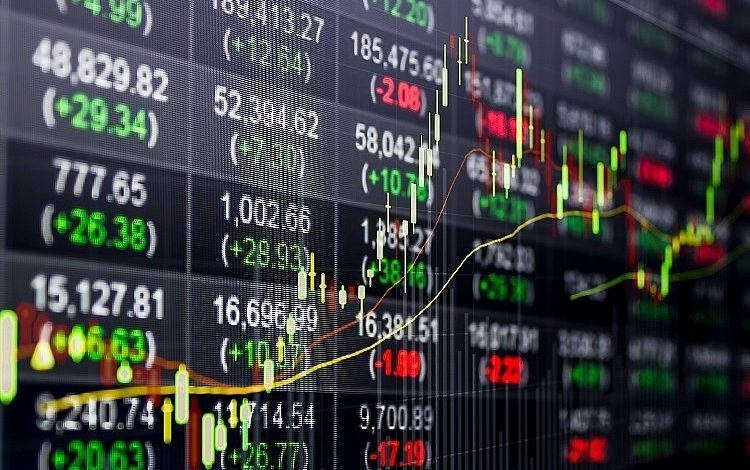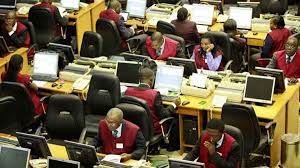Stocks dip as inflation worries rattle investors.


The activities on the stock market took a negative turn last Tuesday, following the increase of the Monetary Policy Rate (MPR) for the third time in a row in an effort to stabilise prices. This news did not make for a happy atmosphere on the trading floor of the Nigerian Exchange Limited (NGX), which is owned and operated by the Nigerian government.


In point of fact, the aggressive monetary policy tightening that has been implemented by the Central Bank of Nigeria (CBN), which has resulted in the increase of the MPR from 14% to 15.5% in order to combat rising inflation, has caused the stock market to lose more than N96 billion in just three trading sessions.
The market capitalization of listed equities, which was at N26,547 trillion on the eve of the announcement on Monday, September 26, 2022, decreased by N96 billion (in three trading sessions) to close at N26,451 trillion on Friday. At the same time, the all-share index (ASI), which measures the performance of quoted companies, decreased by 194.19 points, or 0.4 percent, from 49,218.35 to 49,021.66.
As a direct response to the proclamation, the stock market promptly reversed its recent gains, resulting in a loss of N15 billion by the time trading was completed.
As a consequence of this, the majority of the blue-chip stocks that are responsible for pushing market capitalization, such as Nestle, Bua cement, MTN Nigeria, and GTCO, have been on a downward trend ever since the announcement was made. This has weighed on the index as a result of a massive sell off in very high traded volume and negative market breadth.
Indeed, the low valuation of the NGX, high earnings and dividend yields on improved earnings released so far in the year, combined with the expectation of third-quarter corporate earnings, have failed to push the market indices higher. This is because sell-offs in large company shares have dragged the key performance indices lower in the midst of inflation hitting 20% and reaching a 17-year high.
Because of this event, investors are remaining on the sidelines for the time being, waiting for further confirmation regarding the direction of the market before making any moves. This is because the outlook for the economy is still uncertain.
As a result of “strong, hawkish monetary policy around the globe,” the Chief Research Officer of Investdata Consulting, Ambrose Omordion, has acknowledged that the rate hike adjustment has further caused another round of selling pressure in the market.
He claimed that the policy position might not necessarily be able to contain inflationary pressure given that the pressure is not coming solely from monetary considerations but also from high costs of petroleum items, growing electricity costs, and increased insecurity, in addition to the rising exchange rate.
As a result, he urged that the economic managers in Nigeria should exert some control over some budgetary movements in order to address the growing problem of food scarcity and insecurity in the country.
“Since the country’s high debt profile would not be able to withstand this rising rate, especially considering that the World Bank and the International Monetary Fund continue to caution central banks to reconsider their policies in order to prevent causing a recession in the world economy.
“We observe that this is already taking place in the United Kingdom, China, Japan, and other countries. “Before things get out of control, it is time for the Nigerian central bank and its Monetary Policy Committee to have a rethink,” he said.
When investors were positioning themselves for the third quarter earnings and interim dividend declaration in 2021, a look at market activities during that corresponding period showed that a stable interest rate that was favourable to the equities market triggered a massive mop-up in shares in the stock market and caused massive price appreciation across sectors. This was shown by the fact that the stock market experienced massive price appreciation.
For example, the share prices of GTCO, United Bank for Africa (UBA), and Unity Bank dropped from their respective highs of N27.90 kobo, N7.60 kobo, and 52 kobo on September 29, 2021, to N17.80 kobo, N6.95 kobo, and 43 kobo on September 29, 2022.
During the same time period, the share prices of AIICO, Axamansard, Sunu, Cornerstone, and Lasaco, all of which operate in the insurance industry, fell from 95 kobo, N2.43 kobo, 45 kobo, 58 kobo, and N1.19 kobo to 52 kobo, N1.67 kobo, 32 kobo, 56 kobo
Under the agro-allied subsector, Ella Lakes and FTN Cocoa also experienced a similar loss of value, with their respective stock prices falling from N4.25 kobo and 48 kobo to N3.60 kobo and 29 kobo respectively.
The current environment of low interest rates and high inflation in 2021 may be to blame for the price appreciation that occurred during the same time period in 2021. This environment caused the real return on equity investments to be -10.91 percent, and the real return on debt investments was -10.65 percent.
It is important to keep in mind that after the expansionary monetary policy of the second half of 2020, rates on debt instruments dropped to the low single digits.
At the conclusion of the third quarter of 2021, the yield on 364-day Treasury bills was approximately 5.34 percent, and the yield on 10-year bonds was approximately 12.5 percent.
The secondary market segment of the stock market became quite positive beginning in the third quarter of 2021 as a result of the attractive yield on bonds and the remarkable fundamentals of the corporations.
The optimistic forecast was accurate until the first quarter (Q1) of 2022, which led to enhanced corporate performance and remarkable scorecards produced by listed businesses. These factors contributed to an increase of N3.02 trillion in market capitalization during the first quarter of 2022.
According to information acquired from the NGX during the course of the period, market capitalization skyrocketed by N3.02 trillion to close on March 31, 2022, at N25.312 trillion. This figure is larger than the N22.297 trillion it opened for trading activities on January 4, 2021.
In the first quarter of 2022, the ASI finished with a gain of 9.95 percent, bringing it to a total of 46,965.48 basis points. The majority of indices ended the period on an upward note, which coincided with the positive performance of most sectors.
The NGX Oil and Gas Index saw the greatest increase in value, rising 28.12 percent. After it, the NGX Banking Index had a gain of 8.55 percent, and the NGX Premium Board Index increased by 6.34 percent. Both of these indices were closely followed by the NGX Index. In addition, the NGX Pension index, the NGX Industrial Goods index, the NGX 30 index, and the NGX Lotus II index all experienced gains of between 5.63 and 6.34 percent, 5.39 and 4.37 percent, and 1.18 percent, respectively.
However, after the first increase in interest rates on May 2022, the NGX sustained losses for the third consecutive session to begin trading for June on a downward note yesterday, as market capitalization dropped further by N9 billion. This marked the beginning of trading for the month of June on a negative note.
The All-Share Index dropped by 16.13 absolute points, which is equivalent to a reduction of 0.03 percent, to finish the month of June at 52,974.15 points. This marked the beginning of the month’s reopening of transactions.
As a result, investors suffered a value loss of N9 billion as a consequence of the market capitalization falling to N28.559 trillion.
Regarding the performance of the market, GTI Securities forecasted a market slump due to the fact that investors will continue to find fixed income rate opportunities enticing in the short term.
In addition, Vetiva Dealings and Brokerage reported that the beginning of the month of June started off on a relatively tepid note. This is due to the fact that investors continue to trade cautiously in light of the higher yields in the fixed income space and the current bearish sentiment in the equity market. The increase in interest rates that took place in June 2022 caused the equity market to suffer a loss of 3.4% during that same month.
Although the market ended the first half of the year (H1) on a positive note, appreciating by N5.64 trillion or 25.3 percent to close at N27.935 trillion in H1 2022, from the N22.297 trillion it opened for trading activities on January 4, 2022, the market subsequently plunged into a downturn in July 2022 with the announcement of the second interest rate hike. This was caused by bargain hunting and investors’ repositioning ahead of the 2021 full year dividend declarations.
The ASI decreased by 2.8 percent by the end of July 2022, falling from 51,829.67, which was recorded at the beginning of the month (July 1, 2022), to 50,370.25. This gain occurred between July 1 and 19, 2022 and accounted for 0.9 percent of the overall increase.
The decline continued until August 2022, with the capitalization falling by N227 billion as a result of sell-offs in most of the stocks with the highest market capitalization, including BUA Cement. To reach its final value of 49, the index had a reduction of 419.93 points in absolute terms, which is equivalent to a drop of 0.83 percent.
Since then, the market has remained on a downward trend, falling by 5.6% between August 1 and September 27, 2022, despite the fact that analysts predict a gloomy outlook due to the increasing insecurity in the country as well as other macroeconomic challenges, coupled with uncertainty in the economy of other countries.
A professor of economics at Babcock University and a former President of the Chartered Institute of Bankers of Nigeria (CIBN), Segun Ajibola, argued that the increase in MPR is a direct reaction to the inflationary pressure in the economy, as well as the increase in money demand by manufacturers and importers to procure the necessary foreign exchange. Ajibola is currently a professor of economics at Babcock University.
He made the point that if more Naira are required to maintain the current level of economic transactions, both domestic and international, then the amount of investable funds in the economy will decrease, which will in turn limit the activities in the capital market.
According to Sheriffdeen Tella, an economics professor at Olabisi Onabanjo University in Ago-Iwoye, an increase in the interest rate will likely result in an increase in the cost of borrowing money from banks.
According to him, this can cause companies that are listed on a stock exchange to look for expansion funding from the stock market, which in turn raises the level of activity in the market.
On the other hand, he emphasised that this cannot rely on additional capital inflow due to the undervalued character of the nation’s currency.
Tajudeen Olayinka, Chief Executive Officer of Wyoming Capital and Partners, also contributed to the discussion. He stated that investors initially reacted negatively to two quick successions in MPR hike by holding back further investment in equity on the one hand, and repricing existing securities across markets and instruments on the other hand.
“The primary objective was to determine how the Monetary Policy Committee of the Central Bank of Nigeria (MPC) would respond to a sharp increase in inflation (22.52 percent) in August 2022, which ultimately resulted in a further increase to 15.50 percent in September.
“As a result, investors will be cautious for the time being as they wait to see what will become of yields in the fixed income area after the third increase in a short succession of hikes.
“The repricing of our instruments and assets, which also includes loans and advances, has been going on for quite some time now. “And given the fact that prices are low, it won’t be long until the market begins to gradually rebound to more appreciable levels,” he said. “And given the fact that prices are low.”
Join our 100,000+ members and never miss our members’ exclusive Breaking News and Entertainment Gist.
Gain Access to Our Private News Room
Popular Stories right now
- Europe will standardise phone chargers in 2024, forcing Apple to use USB-C.
- NEWS JUST IN: NNPC’s profit to increase to N674 billion in 2021
- Tramadol worth N8.8 billion is recovered by the NDLEA.







